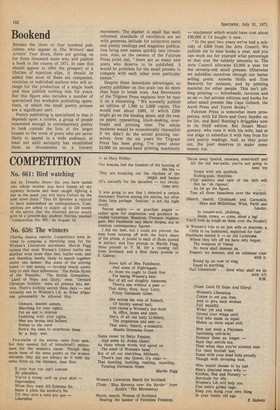Bookend
Besides the three or four hundred publishers who appear in The Writers' and Artists' Year Book, there are getting on for three thousand more who will publish a book in the course of 1971. In case this should appear to offer the prospect of a lifetime of rejection slips, it should be added that most of these are companies, societies or individual authors who will arrange for the production of a single book and then publish nothing else for years. But this figure also includes a number of specialized but workable publishing operations, of which the small poetry presses are a significant part.
Poetry publishing is specialized in that it depends upon a coterie, a group of people interested enough in contemporary poetry to look outside the lists of the larger houses to the work of poets who are never likely to appeal to a wide audience, at least not until antiquity has established them as monuments to a literary movement. The market is small but wellinformed; standards of excellence are set with generous latitude for subjective taste; and poetry readings and magazine publication bring new names quickly into circulation. Also, as the owners of the Fulcrum Press point out, "there are so many new poets who deserve to be published, it would be pointless for the small presses to compete with each other over particular names."
Despite these immediate advantages, no poetry publisher on this scale can do more than hope to break even. Asa Benveniste of the Trigram Press explains how he runs it on a shoestring. "We normally publish an edition of 1,500 to 2,000 copies. This would cost about £500, of which £200 might go on the binding alone, and the rest on paper, typesetting, block-making, overheads and printing time. The whole business would be economically impossible if we didn't do the actual printing ourselves. Over the six years the Trigram Press has been going, I've spent about £3,000 on second-hand printing machinery — equipment which would have cost about £30,000 if I'd bought it new.
"In the past two years we've had a subsidy of £300 from the Arts Council. We publish six to nine books a year, and you can work out for yourself what percentage of that cost the subsidy amounts to. The Arts Council allocates £2,000 a year for the seventy-odd small presses. Otherwise we subsidise ourselves through our better selling poets, Anselm Hollo and Tom Raworth for instance, and by printing material for other people. This isn't jobbing printing — letterheads, invoices and so on — but private editions and books for other small presses like Cape Goliard, the Anvil Press and Turret Books."
Fulcrum Press is somewhat more prosperous, with Ed Dorn and Gary Snyder on its list, and Basil Bunting's Briggflats now in its third edition. But Stuart Montgomery, who runs it with his wife, had at one stage to subsidize it with fees from his own poetry readings. And, as they point out, the poet deserves to make some money too.










































 Previous page
Previous page